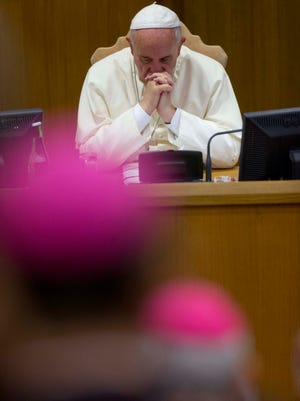It has been nearly 14 centuries since the priory founded by Saint Hilde of Whitby, a prominent abbey in Anglo-Saxon England in the 7th century, hosted an assembly of the Kingdom of Northumbria to discuss the date on which the Christian church would celebrate Easter. This assembly, or synod, would bring the Church of the Kingdom into line with the Catholic Church in Rome.
“Scholars have long thought Heald was a member of that synod,” said Katie Boggis, associate professor and intern of medievalism in the liberal studies program at the University of Notre Dame in South Bend, Indiana.
St. Held’s notwithstanding, women have been denied decision-making at the highest levels of the Catholic Church — that is, until Wednesday, when Pope Francis ordered unprecedented changes to the upcoming Synod of Bishops at the Vatican in Rome: to have a voice — and voting power — in Assembly, as well as non-clerical believers.
“I like to think Heald is still directing this process,” said Boggis.
A huge and welcome step
The pope’s changes to the church’s highest deliberative body include inviting 70 non-bishop members to the October meeting, 10 from each of the seven regional conferences around the world. The Pope mandated that each delegation, chosen from the religious orders and sects, include five women; He also asked for the involvement of young people.
Jimmy Manson, president of Catholics for Choice, a group that supports Catholics demanding reproductive freedom, applauded the move.
“Pope Francis’ unprecedented decision to finally open the doors of the Synod of Bishops…to ordinary people is a tremendous and welcome step toward a more just and inclusive Church that listens to, reflects on, and is guided by the wisdom and lived experiences of the Church,” Manson said. It is badly needed, especially for its concern with ensuring that half of all lay recruits are women.”
The move is important given that among the topics of discussion will be the role of women in the church, said Kathryn O’Donnell, a history professor at Arizona State University in Historical, Philosophical and Religious Studies in Tempe.
At the same time, O’Donnell notes, the number of women authorized to speak and vote is relatively small. An additional 70 participants in the Synod will represent less than a quarter of the 300 bishops who make up the bulk of those present.
“My sense is that this reflects Francis’ effort to create a more inclusive Catholicism without directly upsetting the gender architecture of the church,” O’Donnell said.

However, this is a marked change from the synod held in 2019, when women’s religious groups were invited to attend as observers but not as voting members.
“It drew a lot of criticism—perhaps because it was so clear that it was based solely on sex, not on a division between clergy and laity,” said O’Donnell. “This change is important.”
This move mirrors Pope’s record
While it’s unclear how regional conferences will go about selecting female and/or youth participants, attendees will “speak as part of the process,” Boggis said. “They won’t just be silent observers…. Incredibly important, I think — but it aligns perfectly with Francis’ papacy up to this point.”
Boggis cited a 45-page document released by the Vatican last fall that presents the views of Catholics around the world, one of which he deemed significant for including comments critical of the church’s lack of women in church leadership and decision-making as well as its stance on LGBT people, among other things.
Entitled “Enlarge Your Tent Space”, the document Suggest further efforts towards inclusion. It also promoted “synodicism” as an expression of Catholicism’s form and mission, and a process of “common journey” where everyone hears the Holy Spirit or God in their own way and each listens to the other.
“That’s exactly what he does,” Boggis said. “Expanding the pool space to include voices that aren’t included. And seeing that half of those are women — and women of all ages — is very exciting.”
The document, she said, made clear the pope’s belief in the importance of local churches, “that the church is essentially a community of believers in different locations with different needs, and that these communities need to be recognized at a higher level. His call to represent everyone – that’s the essence of the council.”
In addition, the pope in January 2021 amended canon law to allow women to read the Bible and serve as Eucharistic chaplains, she said — roles previously reserved for lay men. While still asserted that women could not be priests, the move was a game-changer for women in parishes that strictly adhered to the previous formulation regarding positions of acolyte and leaders and barred women from such roles.
The latest development could mean amplifying debates about whether women should be ordained, Bogis said, a long-running debate issue that has inspired papal working groups to consider the historical and theological basis for making such a change. Groups like Discerning Deacons, based in Minneapolis-St. Paul’s district, had lobbied the pope to allow women to serve as deacons.
“At least, that’s going to continue,” said Bogis, “that women are involved in the Synod process. Francis has opened that door and it’s going to be really hard to close it.”

“Incurable bacon nerd. Lifelong tv aficionado. Writer. Award-winning explorer. Evil web buff. Amateur pop culture ninja.”
